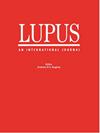Impact of perception of illness on quality of life in juvenile systemic lupus erythematosus
IF 1.9
4区 医学
Q3 RHEUMATOLOGY
引用次数: 0
Abstract
ObjectiveSystemic lupus erythematosus (SLE) is a chronic autoimmune disease that affects multiple organs, notably the skin, joints, and kidneys. The primary goal in managing SLE is to enhance patients’ quality of life (QoL). Illness perception can influence QoL in patients with chronic disease. We assessed illness perception in juvenile SLE (jSLE) patients and its effect on patient’s and parental QoL.MethodPatients diagnosed with jSLE according to the SLICC 2012 criteria between January and November 2023 were included. Patients’ illness perceptions were gaged using the brief illness perception questionnaire (B-IPQ), while patient’s and parental QoL were evaluated using PedsQL and WHOQOL- BREF, respectively.ResultsThe study comprised 32 patients and 32 parents, predominantly female (78.1%). Musculoskeletal involvement was the most common (65.6%), followed by mucocutaneous (59.4%), renal, and hematological involvement (50% each). Neuropsychiatric involvement was absent. The median SLEDAI-2K score at the last outpatient clinic visit, which was documented in the patient’s file was 2 (0–18) and was not correlated with the B-IPQ score (r = 0.121, p = .51). A significant negative correlation was found between B-IPQ and patient QoL, indicating poorer QoL in patients with negative illness perceptions (r = −0.576, p < .001). No correlation was observed between parental QoL and B-IPQ ( p => .05). Of note, 56.3% of patients had poor QoL, scoring below the PedsQL cut-off, while 43.8% of parents had poor QoL for general health, scoring below the WHOQOL-BREF cut-off for general health.ConclusionAlthough disease perception did not correlate with disease activation in jSLE, it significantly impacted patient QoL. Enhancing patients’ perceptions of jSLE may improve their overall QoL.对疾病的认知对幼年系统性红斑狼疮患者生活质量的影响
目的系统性红斑狼疮(SLE)是一种慢性自身免疫性疾病,会影响多个器官,尤其是皮肤、关节和肾脏。治疗系统性红斑狼疮的首要目标是提高患者的生活质量(QoL)。疾病感知会影响慢性病患者的生活质量。我们评估了青少年系统性红斑狼疮(jSLE)患者的疾病认知及其对患者和家长生活质量的影响。采用简短疾病认知问卷(B-IPQ)评估患者的疾病认知,并分别采用 PedsQL 和 WHOQOL- BREF 评估患者和家长的 QoL。最常见的是肌肉骨骼受累(65.6%),其次是粘膜(59.4%)、肾脏和血液受累(各占 50%)。没有神经精神疾病。患者档案中记录的最后一次门诊就诊时的 SLEDAI-2K 评分中位数为 2(0-18),与 B-IPQ 评分无相关性(r = 0.121,p = 0.51)。B-IPQ 与患者 QoL 之间存在明显的负相关,表明对疾病有负面认知的患者 QoL 较差(r = -0.576,p <.001)。父母的 QoL 与 B-IPQ 之间没有相关性(p => .05)。值得注意的是,56.3% 的患者 QoL 较差,得分低于 PedsQL 临界值,而 43.8% 的家长 QoL 较差,得分低于 WHOQOL-BREF 临界值。提高患者对 jSLE 的认知可能会改善他们的整体 QoL。
本文章由计算机程序翻译,如有差异,请以英文原文为准。
求助全文
约1分钟内获得全文
求助全文
来源期刊

Lupus
医学-风湿病学
CiteScore
4.20
自引率
11.50%
发文量
225
审稿时长
1 months
期刊介绍:
The only fully peer reviewed international journal devoted exclusively to lupus (and related disease) research. Lupus includes the most promising new clinical and laboratory-based studies from leading specialists in all lupus-related disciplines. Invaluable reading, with extended coverage, lupus-related disciplines include: Rheumatology, Dermatology, Immunology, Obstetrics, Psychiatry and Cardiovascular Research…
 求助内容:
求助内容: 应助结果提醒方式:
应助结果提醒方式:


